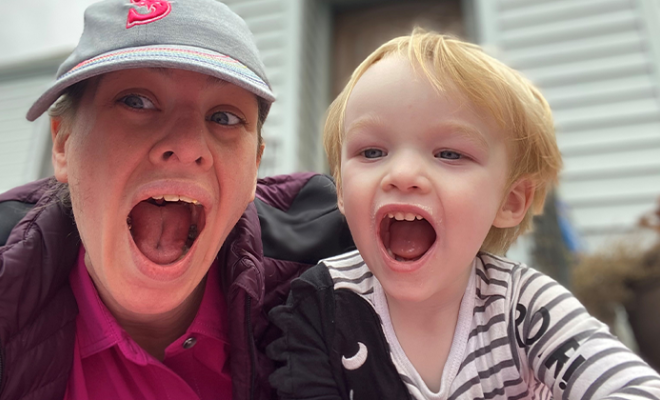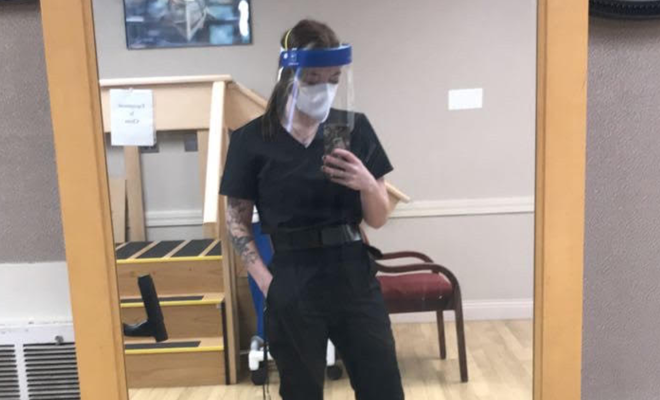We have a strong, resilient family — we come from generations of people who refused to give up and muscled through whatever came at them because they had to. They taught us how to find what we want and chip away at whatever stands between us and our goal, and the struggle made us strong, independent, and thirsty for the knowledge that would help us achieve. I bet you come from people like that too — stubborn and goal-oriented. People like us are often overwhelmed when presented with the unknown; we want to know what to fight and who our enemy is. Unfortunately, being given a new diagnosis of a disease that you probably hadn’t heard of, doesn’t have a cure, or enough research behind it leaves us drowning in uncertainty. It means our support system doesn’t know how to help, and we don’t yet know what we need. Here are the things that I found supported us best when our son was diagnosed with cystic fibrosis:
- Good information: At clinic you’re told not to Google CF — the information online is outdated and not what you need to be looking at when being present is a struggle. You’re told that the Cystic Fibrosis Foundation website is the source you should use, and my mother-in-law was all over it — she went to a booth and brought back packets and a phone number. My aunt sent me links to their short videos with explanations, and another aunt made sure to use the right terminology when she saw me mindlessly doing percussions when we visited one time. Knowledge is power, and my aunts both made sure that I had access, and that I was aware that they were educating themselves for us too. That saves me the emotional energy of explaining everything and feeling like I am around people who “get it.”
- Just being there: I know we’re now two years into a pandemic, but you don’t need to hold my hand to be with me. We struggled a lot with nebulizers, fighting and screaming the whole time. It helped being able to video-call my grandma or mom and just know that I wasn’t the only one who had to listen to the horrible sounds. *IDK or care if you mute me as long as you periodically check in*
- Keep enzymes for us: We have a friend we only visited a few times, but she still has a handful of enzymes in case she ever needs to watch him, or if we stop by for food. Being the sole person responsible for making sure that there are always meds if we eat is a heavy load to carry, and there is guilt and a big mess to clean up if it’s screwed up.
- Tell me you need a rain check: My whole life shifted to prioritize protecting this tiny person’s lungs. Save us both the guilt and let me know if you’re not feeling well or were around someone who was sick. I might tell you I’d like to reschedule, request that you wear a mask (the kid hasn’t known anything else anyway), or tell you that I’m OK with it — but please respect my need to control the very few things that I can.
- If you’re physically around: Ask me what I’m doing/why, and ask if you can help. My parents know how to do chest physical therapy, vest, and nebulizer treatments. It’s really nice knowing that we have a backup option if needed and that I can rely on treatments being done. If you or they are unsure about it, our clinic has been great about offering to have virtual appointments to train others for us. It helps me know that I can have a break, and it helps normalize it for my child too.
- Tell me: Decision fatigue is real. Don’t ask me if I want something — tell me. Tell me you’re going for a walk at this place and time and that you’d love it if I joined you. That way I don’t feel like I might be a burden, and I don’t waste more brain power trying to juggle when would be least inconvenient for everyone. Tell me you’re dropping something off on my porch and that I don’t need to be around or that it’s already done. I promise, you didn’t guess wrong and whatever you did was appreciated because you took on the emotional labor that is so much work for us right now and just did it. We’ll return the favor some day when life settles because we understand the value of not needing to decide on the little things that don’t matter.
- Be mindful: There are a lot of body issues in the CF community because dietary needs are different. We are probably raising our children differently than others. I don’t care if my kid has to run circles around the house to take a single bite each time he passes, because that is still getting caloric intake. I’m willing to let him have ice cream sometimes on a daily basis. I salt his food while getting side eyed. I will not tolerate anyone commenting on him going back for seconds or thirds, and we don’t talk about his body unless it is to empower. It was hard to give my newborn applesauce and to have to supplement while nursing, and then administer appetite stimulants. I will educate you quickly and harshly, because this is our reality, and it was difficult to accept. Ask me what you can keep around for snacks or throw some extra salt onto the table for us, but keep your comments to yourself, please.
- Share: CF is a rare disease — help share our posts or inform others that it’s more than just a childhood illness, because it is. Adult centers are a thing because life expectancy has increased and funding has advanced so much in the past 30 years. Help me be able to say, “They have cystic fibrosis,” and not have the response be, “I’m sorry,” or “That’s the lung thing, right?” It affects more than just the lungs. The more people who know and sympathize, the more normal our lives can be, and the less we’ll have to shout for a cure.
- Check in: Start with, “I know you might not have an answer right now, but do you need anything? How are you?” A lot of places are still only allowing one caregiver per appointment. Check with the other caregiver(s) too — do they feel empowered/supported? How are things divided? A lot of support groups are mom-specific — is dad getting what he needs? Are they sharing responsibilities or growing resentment? Ask both sets of parents your questions, not just your side of the family.
What should you be doing to help your loved one with CF? You’re already doing it — you’re caring, and actively trying to find out what’s needed. Thank you.
Interested in sharing your story? The CF Community Blog wants to hear from you.





